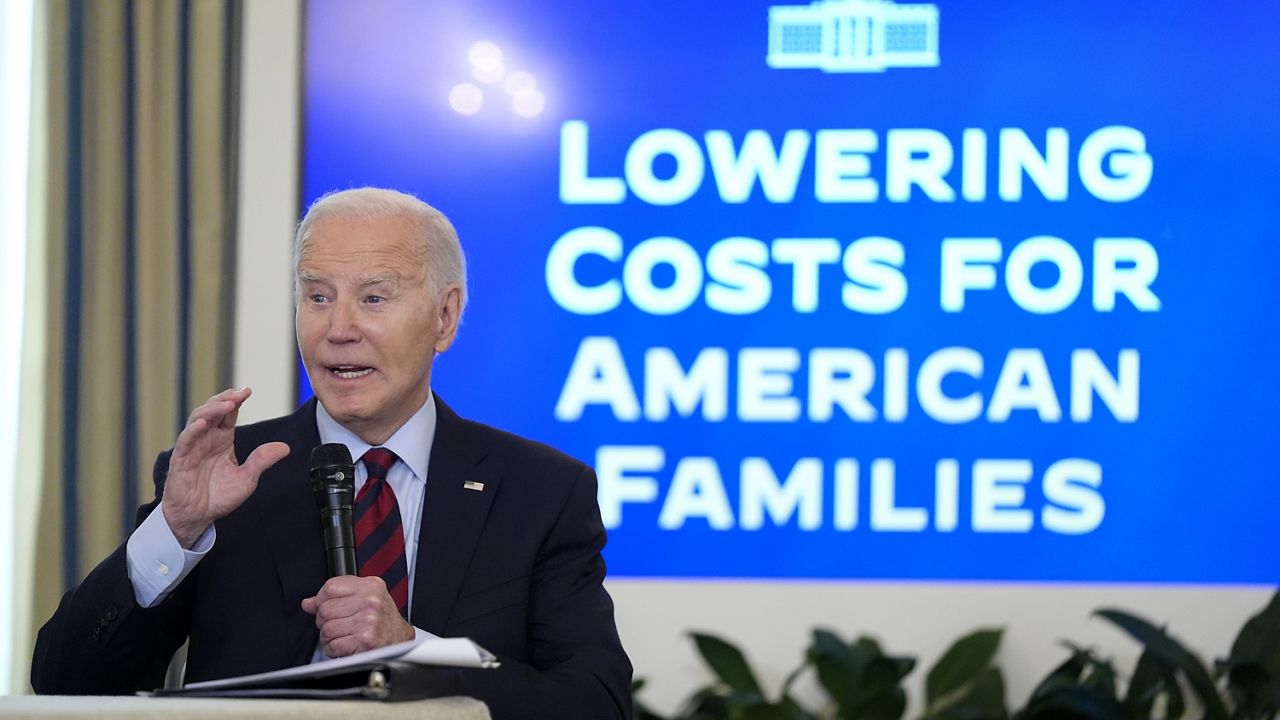President Joe Biden on Tuesday announced an inter-agency strike force that will work to hold companies accountable for artificially high consumer prices.
Co-chaired by the Department of Justice and the Federal Trade Commission, the Strike Force on Unfair and Illegal Pricing seeks to combat elevated prices for everything from groceries and banking fees to airfares and basic utilities.
Biden made the announcement on Tuesday at the start of a convening of his competition council at the White House, referring to the new strike force as “a crackdown on companies who break the law while keeping prices high for American consumers.”
“Capitalism without competition is not capitalism,” Biden said on Tuesday. “It’s exploitation.”
The president went on to assert that despite inflation easing over the last year, one reason for persistent high prices is due to some companies “still not passing along the savings to their customer.”
“Many corporations are raising their prices, pad their profits, charging folks more and more for less and less,” Biden said on Tuesday.
“Over the last year, supply chains have returned to normal and inflation has come down,” National Economic Council Director Lael Brainard said during a press briefing before the announcement. Yet, “some corporations are tacking on extra fees, hiding costs and sometimes even breaking the law,” Lael added.
“If you keep prices high while engaging in illegal practices that are fraudulent or unfair, deceptive or anti-competitive, we will enforce the law,” Biden said.
The strike force is an outgrowth of an Executive Order on Promoting Competition in the American Economy President Biden enacted in 2021 to prevent companies from growing so large they control too much of the market. Increased competition helps to lower prices, increase wages and level the playing field for small businesses, Brainard said.
Biden on Tuesday pointed to a post from the “Sesame Street” character Cookie Monster’s X account, the platform formerly known as Twitter, on Sunday in which the character complains about “Shrinkflation” and notes “cookies are getting smaller.”
“Cookie monster – he pointed out his cookies are getting smaller, paying the same price” Biden said to chuckles from members of his competition council seated at two tables in the White House State Dining Room. The practice of “Shrinkflation” refers to companies charging the same price for less of a product.
Meanwhile, as part of his ongoing and self-proclaimed war on what he calls “junk fees,” the president on Tuesday also announced the Consumer Financial Protection Bureau finalized a rule to reduce credit card late fees from an average of $32 to $8. The move is expected to save consumers $10 billion annually or about $220 per year for those who are charged such fees.
“Late fees have gotten out of control due to a loophole in a 2010 regulation that has allowed large credit card companies to sidestep a federal ban on unreasonable fees,” Consumer Financial Protection Bureau Director Rohit Chopra said during the briefing. “Almost all of the credit card giants have been hiking these fees every year using automatic inflation adjustments as an excuse.”
The Biden administration over the last year has announced a series of actions to crack down on hidden or surprise fees in a range of areas, including TV video services, health insurance and more.
In October, the FTC proposed a wide-reaching rule that would require businesses from a range of industries to disclose all fees upfront as part of the total price a consumer sees when shopping to spur companies to compete on price rather than their ability to hide pricing. The rule will also require businesses to disclose whether fees are refundable.
That rule has not yet been finalized but Chopra told reporters at a separate briefing on Tuesday that the administration has seen companies shift strategies in anticipation of the rules being finalized.
“Even before we have finalized some of these rules, we have basically seen how some of these very large firms have realized, we are on to them and they are cutting fees proactively,” Chopra said.
Deputy Director, National Economic Council on Lowering Costs Jon Donenberg told reporters that the FTC rule, when finalized, “should have a really big impact.”
Donenberg noted that the administration’s approach to tackling these fees is a combination of proposing rules to hold companies accountable while also focusing on simply “making sure that there is better consumer understanding of what is going on.”
“Because these types of practices thrive when there is not enough attention on them and people don’t understand what is happening,” he said, “and that is part of why you see the president drawing attention to these kinds of practices.”
The COVID-19 pandemic led to global supply shortages and the highest inflation in decades in 2022. While the inflation rate fell to 3.1% in January, according to the Bureau of Labor Statistics, food and housing costs have remained stubbornly high.
During the president’s sixth meeting of his Competition Council Tuesday, the U.S. Department of Agriculture also finalized a rule designed to stop meat and poultry processing companies from using deceptive contracts and retaliatory practices that prevent small farms and ranches from being able to join forces. The USDA is leveraging and expanding the existing Packers and Stockyards Act to prohibit unjust discrimination and prejudice and to encourage more competition in meat and poultry processing that can help reduce food prices.
Working as part of the new strike force, the Federal Communications Commission on Tuesday also announced it is circulating a proposed rule to stop landlords from “bulk billing,” or charging everyone who lives or works in a building for internet, cable or satellite service even if they do not want it.



